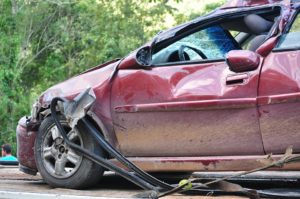DWI Cases – Unique Cases
Personal injury and wrongful death cases that involve drunk driving (driving while impaired) are a unique subcategory of personal injury/wrongful death cases. Drunk drivers do not enjoy certain protections under the civil laws that law-abiding citizens enjoy. For example, in the typical tort case, the victim may only recover compensatory damages against the defendant. In a case where the defendant was driving while impaired, the victim may recover both compensatory damages and punitive damages. (See explanation of difference in compensatory and punitive damages below). Furthermore, there is no cap on the amount of punitive damages that may be awarded in a DWI case, as opposed to non-DWI cases where punitive damages are capped at three times the amount of compensatory damages or two hundred fifty thousand dollars ($250,000), whichever is greater. N.C.G.S. 1D-25(b); 1D-26. Also, a judgment debtor can discharge most types of civil judgments in bankruptcy. However, when the debt represents a judgment arising from a DWI, the judgment cannot be discharged in bankruptcy. 11 U.S.C. 523(a)(9).
Compensatory Damages Where Victim Survives
Compensatory damages compensate a victim for the damages sustained by the victim. Compensatory damages include medical expenses incurred (past and future); lost income (past and future); physical pain and emotional suffering (past and future); permanent injury or scarring, and loss of use of a body part.
Compensatory Damages Where Victim Is Killed
If someone is killed by a drunk driver, the compensatory damages recoverable under the North Carolina Wrongful Death Act, N.C.G.S. 28A-18-2 et seq., are set forth in N.C.G.S. 28A-18-2(b). It provides,
Damages recoverable for death by wrongful act include:
- Expenses for care, treatment and hospitalization incident to the injury resulting in death;
- Compensation for pain and suffering of the decedent;
- The reasonable funeral expenses of the decedent;
- The present monetary value of the decedent to the persons entitled to receive the damages recovered, including but not limited to compensation for the loss of the reasonably expected;
- Net income of the decedent,
- Services, protection, care and assistance of the decedent, whether voluntary or obligatory, to the persons entitled to the damages recovered,
- Society, companionship, comfort, guidance, kindly offices and advice of the decedent to the persons entitled to the damages recovered.
Punitive Damages Also May Be Recovered
Punitive damages (also referred to as exemplary damages) may also be recovered by the victim. Where the victim is killed, punitive damages may be recovered by the family of the decedent. N.C.G.S. 28A-18-2(b)(5). Punitive damages are imposed for the purpose of punishing the impaired driver and deterring the impaired driver and others from driving impaired in the future. Though punitive damages may be imposed upon an impaired driver, punitive damages may not be imposed upon the estate of an impaired driver. See, Harrell v. Bowen, 362 N.C. 142, 655 S.E. 2d 350 (2008). Consequently, when an impaired driver dies in a collision, his estate typically will not be subject to punitive damages for the reckless conduct of the deceased driver. However, family members or other parties may be subject to punitive damages for their own reckless conduct.
Prospective Defendants in a DWI Case
In every civil case involving driving while impaired, potential claims against multiple parties should be investigated and evaluated. Potential defendants include the impaired driver, the owner of the vehicle driven by the impaired driver, family members of the impaired driver, the employer of the impaired driver, legal entities and individuals that provided or sold alcoholic beverages to the impaired driver, social hosts that provided alcoholic beverages to the impaired driver, and legal entities and individuals that aided or abetted the impaired driver in some way. With respect to each prospective defendant, the existence of liability insurance and policy coverage limits must be determined.
Locating the Right Attorney
When a family member has been seriously injured or killed by an impaired driver, the primary focus of the family typically is on the injured or deceased person. It may be difficult to think about pursuing a civil case soon after such a traumatic event. However, because investigative steps need to be undertaken as early as possible, the search for an attorney should not be delayed any longer than necessary.
Finding an experienced attorney who specializes in this type of case, who is aggressive but also is ethical, and who is the right fit personality-wise and temperament-wise, is critical. A good way to find such an attorney is to contact an attorney in your community who you know and trust. That attorney can then give you the names of one or more attorneys who specialize in this type of case.
Do your online research about the recommended attorney or attorneys, and then make contact and schedule a meeting. Bring a trusted family member or friend with you to the meeting if you feel the need for assistance. It is best not to make a decision about an attorney at the first meeting. If the attorney pressures you in any way to sign a contract at the first meeting, consider this a red flag. The decision is too important to be rushed. Discuss your impressions with other family members and friends and make sure you are comfortable with the attorney. Do not discuss the facts of the case with others. All communications with the attorney must remain confidential.
Think about your decision for a day or two. If you are convinced that the attorney is the right fit for you, let the attorney know this. A contingent fee contract and other relevant documents can then be executed.
The Relationship Between The Criminal DWI Homicide Case And The Civil Wrongful Death Case
Contacting The District Attorney
A drunk driver who kills someone may be charged with multiple criminal offenses, including second degree murder. The local district attorney prosecutes the criminal case and protects the interest of the state. The private attorney retained by the administrator or executor of the decedent’s estate prosecutes the civil wrongful death case and protects the interest of the decedent’s family. The interests of the state and the family usually are aligned fairly closely. However, there are times when those interests may diverge. It is important to have an experienced attorney on board to advocate for the family.
The attorney representing the family must recognize that the district attorney is in charge of the criminal case and must stay out of the way of the district attorney. This said, most experienced district attorneys give great deference to the wishes of the decedent’s family in deciding the appropriate disposition of the criminal case. But when push comes to shove, the district attorney (along with the judge) calls the shots in the criminal case. The family’s attorney should facilitate communication between the district attorney and the family to make sure the family’s interest is protected.
A good working relationship between the district attorney, the investigating officers, and the family’s attorney is critical to the successful prosecution of the civil case. Most law enforcement agencies have specially trained investigators and accident reconstruction experts assigned to investigate vehicular homicide cases. These officers and experts gather, document, and preserve the evidence. They are key witnesses in the criminal case. They also are key witnesses in the civil wrongful death case.
One of the first steps the family’s attorney must take after being retained by the family is to contact the district attorney to notify him or her of the attorney’s involvement. In a DWI homicide case, the investigating officers typically will not speak with a private attorney about the case without prior authorization from the district attorney. Most district attorneys and assistant district attorneys want to cooperate with the family’s attorney. They know that the family is devastated by the senseless death of their loved one, and they want to do everything possible to help the family succeed in the civil action, provided the cooperation does not compromise the criminal prosecution in any way.
The district attorney must trust the family’s attorney to use good judgment in how and when to use the information and documentation from the criminal investigation. If there is no trust, the district attorney will provide very little information.
Preparation Before Meeting With Investigating Officer
The family’s attorney will attempt to complete some basic investigation of the case before he or she meets with the investigating officer for the first time.
Sometimes all of this documentation is not available before meeting with the officer, but often it is.
Ideally, the preliminary steps undertaken prior to meeting with the investigative officer will include the following:
- Obtain copy of the collision report
- Interview witnesses listed on the collision report
- Interview other witnesses you learn about from clients and listed witnesses
- Review all insurance policies to which you have access that may provide coverage
- Go to the scene of the collision
- Photograph the scene of the collision
- Download Google photos and maps of the scene
- Obtain certified copies of every document in the criminal file from the clerk’s office, including the bond and conditions of release
- Obtain a certified copy of the defendant’s driving record from DMV
- Obtain a copy of the defendant’s criminal record
- Obtain a copy of the 911 tape
- Search and download all news accounts of the collision
- Download pattern jury instructions for all potential claims
- Examine the vehicles involved in the collision
- Download and preserve all social media information for the drunk driver, the family of the drunk driver, the victim and his family, and all prospective defendants
- Instruct clients to cease posting on social media and explain to clients that postings on social media often wind up being admitted as evidence in court proceedings
- Have an engineer examine the electronic data recorder from the vehicles, photograph the vehicles, document the scene of the collision
Meeting With The Investigating Officer
Once the district attorney gives the family’s attorney the green light to meet with the investigating officers, the attorney will arrange a meeting with the officers. The investigation may still be in the early stage, with officers waiting for lab results and autopsy results. Even though to may be early in the investigation, it is best to go ahead and meet with the officer.
Before meeting with the officer, the attorney will have already obtained copies of the documentation publicly available, as well as information and documentation produced by the family. The attorney can review this information and documentation with the officers. The attorney may even be able to assist the officers by providing some information.
The procedure for obtaining documentation from the officers and the district attorney will vary depending on the jurisdiction and the level of trust and cooperation between those officials and the family’s attorney. Ideally, full access to all documentation to the family’s attorney will be provided at some point. This documentation, as well as information from experts hired by the attorney, is critical to the attorney’s investigation of the potential direct claims against the impaired driver, or his estate. This documentation is also critical to the attorney’s investigation of the potential claims against the other prospective parties to be included as defendants in a civil action.






Comments are closed.